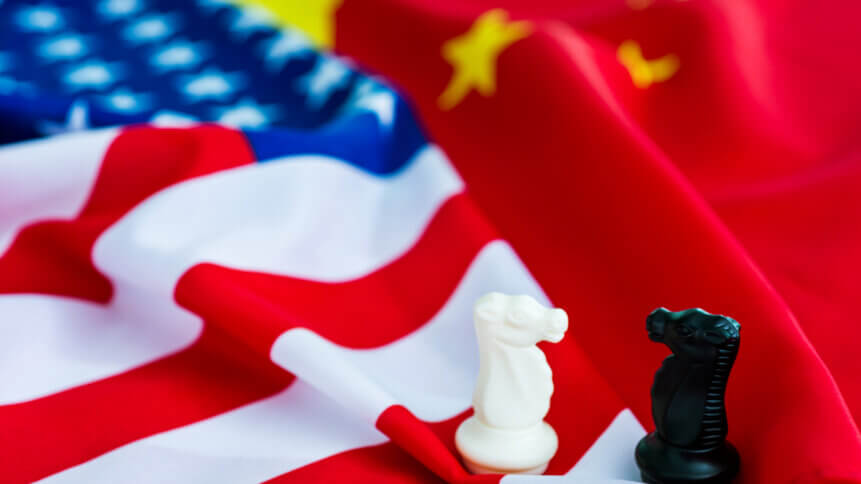US investments in China under further government threat?

• New restrictions on US exports to China mooted.
• Rules could apply to AI and quantum computing too.
• How far can US trade with China be curtailed while relationship is maintained?
In October 2022, the US announced its most aggressive measures to date aimed at limiting China from accessing American advanced computer chips and chipmaking equipment. The Biden administration said it was focused solely on chips to curtail Beijing’s military modernization and, at the same time, minimize harm to the American chip industry.
The draconian trade rule has a global sweep to stop chipmakers in the US and overseas from supplying advanced chips to China for use in artificial intelligence, supercomputers, and supercomputing-related activities.
While the rules released by the Commerce Department were the most drastic by the US at the time, it appears they weren’t the last.
After all, President Biden constantly assesses how aggressively his government should limit economic engagement with China. Like his predecessor, his main goal is to curtail Beijing’s technological and military rise – which usually starts with export restrictions.
Over the last couple of months, though, there have been rumors that the government has been working on more unprecedented rules – this time limiting American investments in China.
When Reuters first reported on the rules in February, it was said that they would involve a ban on investments tied to chip production. The rules track the sweeping new restrictions the US placed on exports of American artificial intelligence (AI) chips, chipmaking tools, and supercomputers, among other technologies, to China in October 2022.
However, the latest development indicates that the new rules under consideration would restrict the flow of US investments and know-how into Chinese companies working not only on advanced semiconductors, but on artificial intelligence and quantum computing too, a US Treasury official said on Wednesday.
Speaking before a Senate Banking Committee hearing, Paul Rosen, who oversees investment security at the Treasury, said officials are working on curbing investment from the US that “comes with know-how and expertise in certain specific sectors and subsectors such as advanced semiconductors, artificial intelligence, and quantum computing,” citing China and its military in particular.
For context, the Biden Administration plans to crack down on the billions of dollars American firms have poured into sensitive Chinese sectors. Anti-China advocates in Washington blame US investors for transferring capital and valuable know-how to Chinese tech companies that could help advance Beijing’s military.
It’s interesting that the developments come at a particularly delicate moment for the administration, which has been trying to smooth tensions and maintain trade ties with Beijing. That tightrope walk highlights the challenges facing Biden’s escalation of efforts to rein in one of the world’s largest military and economic powers.
To top it off, anti-China fervor is at a peak among lawmakers and the public after the Chinese flew a spy balloon over the US in February. But aggressive actions to sever the relationship could risk plunging both nations into a downward economic spiral.
Jay Shambaugh, Treasury undersecretary for international affairs, said during a discussion at the Brookings Institution last month, “It is important for the US to be clear [that] we do not seek to decouple from China or seek to limit China’s growth in any way.”
He meant that though the US will sometimes “take targeted national security actions” aimed at Chinese firms, like last year’s trade rules targeting Chinese microchip makers, those policies are “not things we’re doing to benefit the US economically vis-a-vis China.” The latest law will be laid out in an executive order that the White House is expected to unveil sooner rather than later.
Since the Trump administration, national security lawmakers and Cabinet officials have sought to craft new rules to oversee — and potentially block — US investments in Chinese tech sectors. The goal is to prevent American firms from funding or developing tech that the Chinese military can later use.
Shutting off supplies to the military forces of China – even indirectly – could well become a key strategic goal of the US.
The US-China row over Huawei – not quite over?
At the same Senate Banking Committee hearing, Republican Senator Bill Hagerty asked about efforts to restrict the supply of US-origin goods to Chinese telecommunications company Huawei. Currently, any exports to Huawei require a license.
When asked about revoking these licenses, Commerce Department assistant secretary Thea Rozman Kendler said, “We do not have a draft rule at this time,” but added, “We are under deep analysis of this issue.” The talks on Huawei resurfaced because officials have been closely scrutinizing a wide range of exports to China.
Some lawmakers highlighted that last year they denied or took no action on a quarter of requests to stop sales that would advance Beijing’s militarization. Ahead of the Senate Banking Committee hearing, Kendler noted in written testimony that in 2022, 5,064 export and re-export license applications were reviewed, and roughly 26% were denied or returned without action.










